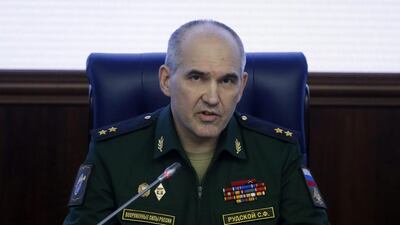MOSCOW // Russia on Monday warned that it will start responding to ceasefire violations in Syria unilaterally from Tuesday if the United States refuses to coordinate rules of engagement against the violators.
The Russian military has accused the US of dragging its feet on responding to proposals for joint monitoring of the ceasefire brokered by Moscow and Washington, now in its fourth week. A top Russian general said further delays are leading to civilian casualties
The truce and the resumption of UN-mediated peace talks in Geneva last week had raised hopes of a political solution to Syria’s five-year conflict.
Lt Gen Sergei Rudskoi said Russia would have to use force unilaterally because the US, in talks last week, had refused to coordinate a joint response.
“The American side was not ready for this particular discussion and for the approval of the agreement,” he said.
A US official in Geneva dismissed the Russian claim.
“Whoever is making such statements must be misinformed, because these issues have been discussed at length already, and continue to be discussed, in a constructive manner,” the official said.
The UN special envoy for Syria, Staffan de Mistura, whose office is helping monitor ceasefire violations in Syria, said he was “extremely supportive” of US and Russian cooperation to bolster a peace process for the country.
“The moment that they don’t talk substantively, we go back to the past,” Mr de Mistura said, “and we can’t afford it – and they know it too.”
Meanwhile, Syrian government negotiators insisted on Monday that the future of president Bashar Al Assad, who is backed by Moscow, was not part of the talks.
“President Assad has nothing to do with the talks,” lead government negotiator Bashar Al Jaafari said.
The main opposition High Negotiations Committee (HNC) has made Mr Al Assad’s departure a non-negotiable demand before any peace deal can be agreed.
Mr Al Jaafari insisted that a political transition in Syria and Mr Al Assad’s fate were “two separate issues”.
“The references of our talks do not give any indication whatsoever with regard to the president of the Syrian Arab Republic,” he said.
Mr Al Assad’s future “is something that is already excluded from the scene”, Mr Al Jaafari said after a meeting with Mr de Mistura.
Mr de Mistura has described political transition as “the mother of all issues” standing in the way of a breakthrough, but has not directly addressed the question of replacing Mr Al Assad.
“Everyone more or less agrees, the cessation of hostilities is still holding and frankly largely. The same ... more or less for the movement on humanitarian aid. But neither of them can be sustained if we don’t get progress on the political transition,” Mr de Mistura said his meeting with Mr Al Jaafari on Monday.
As the talks entered their second week, Mr Al Jaafari said the atmosphere was “positive”, even if progress was “lagging”, while charging the HNC with not doing its part.
“We have clear instructions from our leadership to engage seriously in these talks but the other side is not responding seriously,” he said.
Mr de Mistura on Friday said he had been urging the regime to submit concrete proposals for its vision of a transition government that could lead Syria out of a brutal conflict that has killed more than 270,000 people and forced millions of its people to flee the country.
Mr Al Jaafari countered on Monday that his side had given the UN a document addressing principles for a political solution to the conflict.
The Russian and US-brokered ceasefire that began on February 27 has helped to significantly reduce hostilities, although violations have been reported by both sides. The truce excludes extremist group ISIL and the Al Qaeda affiliate Jabhat Al Nusra.
* Agencies

